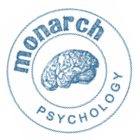
Treatment Models
Clinical Psychologists utilise a variety of treatment models used by psychologists. Below are several of the psychological models used by Monarch Psychology clinicians.
CBT
Cognitive Behavioural Therapy, or CBT, is a short-term therapy technique that can help people find new ways to behave by changing their thought patterns. Engaging with CBT can help people reduce stress, depression, anxiety, assist with relationships, manage grief/loss, and face many common life challenges.
Schema Therapy
Schema Therapy can help individuals identify the thought and behaviour patterns underlying and perpetuating mental health conditions. The treatment approach integrates elements from cognitive behavioural therapy, attachment theory, and a number of other approaches, expanding on CBT through exploration of emotions, maladaptive coping methods, and the origin of mental health concerns.
ACT
Acceptance and Commitment Therapy, or ACT, encourages people to embrace their thoughts and feelings rather than fighting or feeling guilty for them. ACT develops psychological flexibility and is a form of behavioural therapy that combines mindfulness skills with the practice of self-acceptance.
Narrative Therapy
Narrative Therapy is a form of counselling that views people as separate from their problems. This allows clients to get some distance from the issue to see how it might actually be helping them, or protecting them, more than it is hurting them.
Solution Focused Brief Therapy
Solution-Focused Brief Therapy (SFBT) concentrates on finding solutions in the present time and exploring one’s hope for the future to find quicker resolution of one’s problems. This method takes the approach that you know what you need to do to improve your own life and, with the appropriate coaching and questioning, are capable of finding the best solutions.
